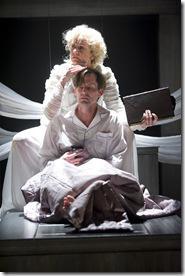
Angels in America:
Millennium Approaches
Written by Tony Kushner
Directed by Charles Newell
at Court Theatre, 5535 S. Ellis (map)
thru June 3 | tickets: $45-$65 | more info
Check for half-price tickets
Read entire review
A work that leaves you a different person after seeing it
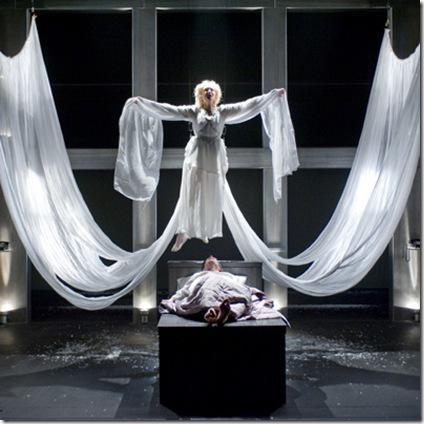
Court Theatre presents
Angels in America
Part One: Millennium Approaches
Review by Catey Sullivan
One is tempted to trot out the big gun adjectives for Court Theatre’s staging of Angels in America. Towering. Magnificent. Monumental. Yet such words only seem to cheapen the accomplishment director Charles Newell has achieved with this seven-hour, two-play event. Tony Kushner’s epic would almost defy staging were it not so brilliantly constructed; it’s at once unspeakably grand and breathtakingly intimate, a series of (mostly) two-person scenes creating a swath of the American experience as expansive as the very continent. Angels in America Part One: Millennium Approaches and Angels in America Part Two: Perestroika, demand a directorial touch that can simultaneously
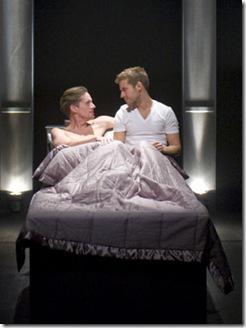
The marketing forces behind Angels insist that Millennium Approaches and Perestroika are two different plays entirely, each of which are equally powerful no matter what order they’re seen in. That’s not true. If you go for Perestroika before Millennium Approaches you’ll be at sea for much of a very long evening. Part One (three hours, 10 minutes) sets the stage for Part Two (three hours, 50 minutes). It establishes not just who is who in Kushner’s intricate web of characters, it also puts you at home in a world that leaps from the physical to the metaphysical in the space of a single breath.
Opening in fall, 1985, Millennium Approaches goes through January, 1986, tracing the stories of Prior Walter and Louis Ironson, a couple set violently reeling after Prior’s diagnosis with AIDS. Their narrative becomes interlocked with that of rising young Mormon attorney Joe Pitt, his valium-popping wife Harper and his closeted boss/mentor, uber-conservative Roy Cohn. These five souls make up the skeleton of Millennium Approaches, but saying the piece is about them is like saying “Lawrence of Arabia” is about an obscure military action during World War I. It is about that, yet it is about so very much more.
Kushner, to my mind, is a stone genius and that brilliant mind shows up with a white hot light in Millennium Approaches. He tackles all the big issues – life, death, love, denial – as he traces the trajectory of each specific character. In Joe’s dawning self-realization that he can’t make himself straight no matter how hard he tries, in Harper’s hallucinogenic despair over being utterly in love with a man who simply can’t return her ardor, in Louis’ tortured, self-absorbed betrayal of the love of his life, in Prior’s descent into the maelstrom of Kaposi’s Sarcoma, and in Roy’s extraordinary, exhausting journey from Washington power broker to a haunted, diseased negation of everything he holds beloved – the world entire is in these people. As they all make their intensely etched, mesmerizing ways from tragedy to triumph and back again and all points in between, Kushner weaves a story that captures the endless complexities and contradictions of life near the end of the Millennium in the United States of America.
You would think that given the late 1980s setting that Angels in America would be dated. It’s not. The references to the burgeoning AIDS pandemic and Ronald Reagan’s zealously conservative politics are now history as opposed to current events, to be sure. It has, after all, been almost 20 years since Kushner won the Pulitzer Prize for Drama; 22 years since the piece debuted at the Mark Taper Forum in Los Angeles. But Angels is history that zings and shatters with the immediacy of not just the present but also the future. As Kushner enfolds the epic into the deeply personal, so he manages to create a piece that is at once specific to its historic period and universal in its timelessness. It’s dazzling..
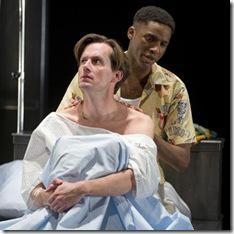 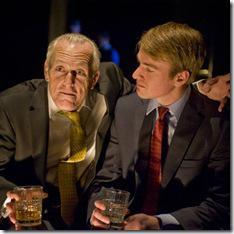
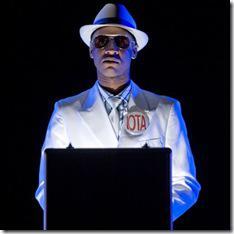 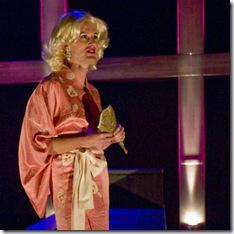 |
Of course it helps that Newell has assembled a cast of actors so fine they all but make you want to weep with gratitude just to watch them work. (And I don’t care how over-the-top that sounds. It’s not hyperbole but bone truth.) Leading the pack is Rob Lindley in a career-making and (surely) award-winning turn as Prior Walter. His scope is mammoth, as Prior is forced to contend with angelic visitations, his lover’s abandonment, and the devastating breakdown of his own body from the outside right down to the cellular level. Lindley makes you see every acute angle of Prior, the agony and the ecstasy, in small moments and huge ones, drawing the audience inexorably to him as he loops around from hell on earth to heaven alternately terrified, confused, joyful, and undaunted.
He’s matched by Larry Yando as Cohn, in a performance that, amazingly, redefines what this actor is capable of. (Amazingly because over the past 20 years, we’ve never seen Yando do anything that was less than heart-stabbingly superb. Here, he takes his formidable skills to a whole new level, particularly in the second act as Cohn, ravaged by AIDS, literally begins to disintegrate in both and mind.)
Ideally, one should see both parts of Angels in America over two consecutive nights. Doing the whole 7-hour show in one day is overwhelming. But if you can only see one portion of Court’s otherworldly masterpiece, make it Part One: Millennium Approaches. It’s the sort of work that leaves you a different person than you were when you walked in to the theater. And it is theater of the most essential, entertaining sort.
Rating: ★★★★
Angels in America – Part One: Millennium Approaches continues through June 3rd at Court Theatre, 5535 S. Ellis (map), with performances Wednesdays/Thursdays 7:30pm, Fridays 8pm, Saturdays 3pm and 8pm, and Sundays 2pm and 7pm. Tickets are $45-$65, and are available by phone (773-753-4472) or online here (check for half-price tickets at Goldstar.com). More information at AngelsInChicago.com (Running time: 3 hours 10 minutes)
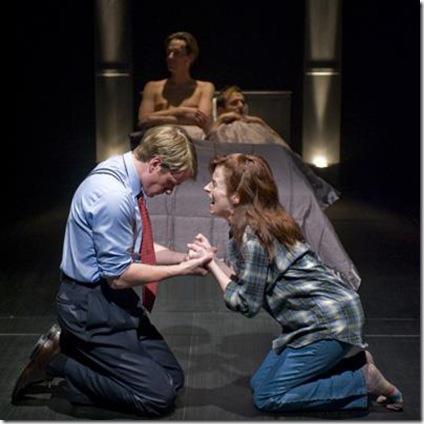
All photos by Michael Brosilow

